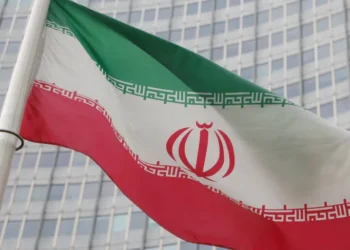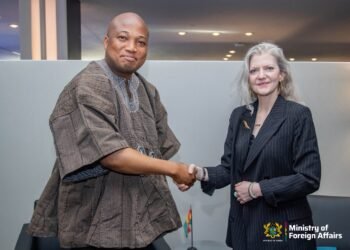Ghana has once again reaffirmed its long-standing commitment to global peace and security, with Minister for Foreign Affairs, Hon. Samuel Okudzeto Ablakwa, making a strong case for the complete elimination of nuclear weapons at the United Nations.
Speaking during the International Day for the Total Elimination of Nuclear Weapons at the ongoing 80th session of the UN General Assembly in New York, the minister stressed that a nuclear-free world is not an unrealistic aspiration but an achievable global goal that requires urgent collective effort.
“We gather to renew our commitment to a world without nuclear weapons. We in Ghana believe that that world is not a utopian dream, it is possible to achieve.”
Minister for Foreign Affairs, Hon. Samuel Okudzeto Ablakwa
The minister situated Ghana’s position within the country’s historical legacy, recalling the pioneering efforts of Ghana’s first President, Dr. Kwame Nkrumah, who in 1962 convened the World Without a Bomb conference in Accra.
That initiative, he said, was not only a national aspiration but also a continental one, as Nkrumah championed the idea of Africa becoming a nuclear-free continent.
“I am delighted that I am from a country where our nation’s father, Dr. Kwame Nkrumah, led the charge against a world that proliferates nuclear weapons. And I am glad that a continent of Africa, as we speak, the only country that had nuclear weapons, has fully disarmed.
“And if Africa can be a continent without nuclear weapons, other continents can follow the example of Africa.”
Minister for Foreign Affairs, Hon. Samuel Okudzeto Ablakwa
Hon. Ablakwa argued that history has already demonstrated that disarmament is possible. He warned, however, that the world risks sliding back into the dark days of nuclear catastrophe if global caution continues to falter.
“Eighty years since the dawn of the atomic age, the observance of this international day for the total elimination of nuclear weapons is a reminder that where the compass of global caution is broken and the enduring pledge of never again is overlooked, the horrors of the past would not remain in the past, it will creep upon us into our present reality”.
Minister for Foreign Affairs, Hon. Samuel Okudzeto Ablakwa
Erosion of Trust in the Global Non-Proliferation Regime
The Foreign Affairs Minister expressed concern about the erosion of trust in the global non-proliferation regime, pointing to the repeated failures of review conferences under the Nuclear Non-Proliferation Treaty (NPT).
He said that the inability of nuclear powers to fulfill their commitments under the treaty undermines its credibility and weakens global faith in disarmament frameworks. “While the NPT remains the cornerstone of our disarmament architecture, each failed review conference chips away at the fragile trust on which the treaty rests,” he noted. Hon. Ablakwa was unequivocal in calling out the perceived double standards in the global nuclear order.
“The situation where some nuclear powers determine that they can keep the earth, but others cannot have it, is untenable and must not be allowed to continue. Ghana demands an end to impunity.”
Minister for Foreign Affairs, Hon. Samuel Okudzeto Ablakwa
He also underscored the importance of other international treaties, such as the Comprehensive Nuclear Test Ban Treaty (CTBT) and the Treaty on the Prohibition of Nuclear Weapons (TPNW). However, he cautioned that their promise remains weakened when compliance is inconsistent or when nuclear states fail to demonstrate leadership.
Submission of Instrument of Ratification
On a more optimistic note, the minister described the day as historic for Ghana. He announced that Ghana would officially deposit its instrument of ratification for the Treaty on the Prohibition of Nuclear Weapons, which the country signed in 2017 and which Parliament ratified in July this year.
“Distinguished ladies and gentlemen, I am happy to note that this is a historic day for Ghana, because today Ghana will be depositing our instrument of ratification following the signing of the TPNW in 2017 and the full ratification of our Parliament in July this year”.
Minister for Foreign Affairs, Hon. Samuel Okudzeto Ablakwa
In concluding his address, Hon. Ablakwa invoked the memories of survivors of the atomic bombings of Hiroshima and Nagasaki, whose testimonies, he said, continue to provide a moral compass for the world.
“Their window of time may be closing and their pained voices hashing out, but their voices still carry the urgency and moral clarity we need today to galvanize us to fulfill our shared promise, not in some distant future, but in concrete action now”.
Minister for Foreign Affairs, Hon. Samuel Okudzeto Ablakwa
Hon. Ablakwa’s remarks reflected Ghana’s enduring stance in support of peace, disarmament, and international justice. By linking the country’s historic leadership under Nkrumah to present-day commitments, the minister emphasized that Ghana’s advocacy is not merely symbolic but a continuation of a principled tradition.
As the world grapples with rising geopolitical tensions and the threat of renewed nuclear competition, Ghana’s voice at the UN adds moral weight to the global call for disarmament. Hon. Ablakwa’s statement reminded nuclear powers and the broader international community that peace and human survival cannot be secured by stockpiling weapons of mass destruction.
Instead, he argued, the path forward lies in dialogue, trust-building, and a shared commitment to ensuring that the horrors of the past never become part of humanity’s future.
READ ALSO: Fix the Economy Before Borrowing Again – World Bank Tells Mahama Government



















